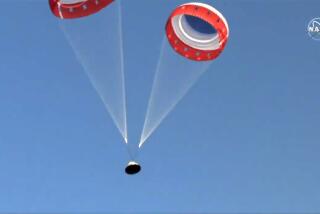NASA to probe alcohol use; ex-astronauts doubt reports
- Share via
NASA officials vowed Friday to investigate reports that astronauts were drunk before missions on at least two occasions. But several former astronauts questioned the claims, saying they were too closely monitored for anyone to risk breaking the rules on drinking before a flight.
“I didn’t see any use of alcohol that infringed safety,” said Tom Jones, who served on four shuttle missions before retiring in 2001. “I didn’t see any flight surgeons who would have hesitated to blow the whistle.”
Susan Kilrain, who left the astronaut corps in 2002, said “there weren’t even any rumors” of astronauts flying drunk.
NASA officials said at a news conference in Washington that the reports of drinking, drawn from anonymous interviews, were unconfirmed.
Nonetheless, they said, a warning has been sent to astronauts reiterating the agency’s policy prohibiting drinking alcohol 12 hours before a flight.
NASA’s director of flight crew operations, Ellen Ochoa, said the agency would immediately start creating a formal code of conduct to address drinking and other aspects of astronaut behavior.
The claims about drunk astronauts were included in a short subsection of a 12-page report on astronaut healthcare, released Friday. An independent eight-member panel convened by NASA wrote the report.
NASA doctors told interviewers of “some episodes of heavy use of alcohol by astronauts in the immediate preflight period,” the report said.
“Two specific instances were described where astronauts had been so intoxicated prior to flight that flight surgeons and/or fellow astronauts raised concerns to local on-scene leadership regarding flight safety,” according to the report. “However, the individuals were still permitted to fly.”
The report provided no details of the incidents.
Air Force Col. Richard E. Bachmann Jr., the panel’s chair, said at the news conference that one case involved a NASA astronaut on the Russian Soyuz spacecraft to the International Space Station.
The other case involved an astronaut on a shuttle mission that was ultimately delayed for technical reasons. The astronaut, still intoxicated, then attempted to fly on a T-38 jet, Bachmann said.
He said the panel left to NASA any investigation to determine whether the claims were true. The panel was created after the February arrest of astronaut Lisa Marie Nowak, who was charged with assault and attempted kidnapping of a romantic rival. Nowak was later fired.
The space agency wanted an investigation of how well it was monitoring the mental health of astronauts.
Bachmann said that whether the claims about alcohol use were true or not, the more important issue was a “deeply ingrained culture” in which flight surgeons felt marginalized. Flight surgeons monitor astronaut health.
The panel interviewed eight NASA doctors. Several described instances in which they alerted officials to medical or behavioral problems and were ignored.
“This disregard was described as ‘demoralizing’ to the point where they said they are less likely to report concerns of performance decrement,” the report said.
Officials pledged Friday to foster a culture of openness, saying that they planned to survey the astronauts and flight surgeons to address the panel’s concerns.
NASA Deputy Administrator Shana Dale said the space agency would implement the panel’s recommendation for yearly psychological reviews of all astronauts.
Prospective astronauts are screened for psychological problems when they apply. Only those later selected for missions aboard the space station receive further testing.
Dr. Patricia Santy, a psychiatrist at the University of Michigan who worked as a NASA flight surgeon from 1984 to 1992, said she often pushed for more extensive psychological reviews but was ignored.
She said astronauts had an incentive to downplay any problems that would prevent them from flying.
“NASA management is in denial that any of their astronauts could behave badly,” she said.
Santy said she had never heard of any astronauts drinking during preflight hours. But she said the claims didn’t surprise her. “These people are cowboys,” she said. “They are hard-living. They take risks. They are very exceptional.”
Former astronauts, though, said they were stunned by the drinking allegations.
“It boggles my mind,” said Daniel Barry, who spent 13 years at NASA before retiring in 2005.
Astronauts work toward a mission “for so long,” he said. “I’ve never seen anybody take a chance with their opportunity to fly, let alone something this obviously stupid.”
Jones said that given the dangers of spaceflight, astronauts themselves would have no problem turning in a crewmate.
“I’m not going to get on a space shuttle that already has a built-in risk with somebody who is going to add to it,” he said.
And getting caught is fairly likely. Astronauts spend a week in quarantine before each shuttle mission, and a flight surgeon is present for the final two days, NASA officials said.
Kilrain said the stomach-churning experience of takeoff was a clear deterrent to drinking. “You feel bad enough as it is without putting a hangover on top of it,” she said.
More to Read
Sign up for Essential California
The most important California stories and recommendations in your inbox every morning.
You may occasionally receive promotional content from the Los Angeles Times.













